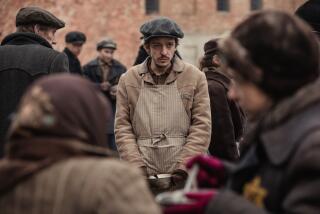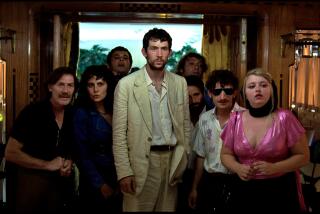Enigma, thy name is ‘Marienbad’
- Share via
Back in the day when cocktail-party chatter used to revolve around the possible meanings of perplexing art films, Alain Resnais’ 1961 movie, “Last Year at Marienbad,” was an unrivaled conversation starter. Here was a film in which nothing is what it seems and everything seems to take place at once.
Some declared it a milestone in the evolution of storytelling and formal filmmaking. Others saw only the emperor’s new clothes -- although, given the dazzling succession of Coco Chanel outfits modeled by its fashion-plate heroine, what clothes they were.
Out this week in a two-disc edition from the Criterion Collection, “Marienbad,” with its solemn mannerisms, geometric topiary and cast of waxwork zombies, has inspired more parodies than any other art-house hit, save perhaps for Bergman’s “The Seventh Seal” (also just reissued by Criterion). But what often goes unacknowledged is the edge of awareness beneath the movie’s straight-faced absurdity.
On one hand, it’s a proudly unsolvable enigma, an attempt to resist chronology and rational analysis and instead to mimic the associative flow of dream logic. On the other, it’s the driest of high-concept comedies: an elaboration on the old “Don’t I know you from somewhere?” pickup line.
In a vast hotel dripping with Rococo trimmings, a nameless woman (identified in the credits as A and played by the gorgeous Delphine Seyrig) is pursued by a nameless man (known as X and played by Giorgio Albertazzi), who tries to convince her they’d met the previous year. He tells her that they had agreed to this rendezvous and that she had promised to leave her companion (a.k.a. M, played by the sunken-cheeked Sacha Pitoeff).
A claims not to remember; X keeps pressing his case, with some success. But is this persistent seducer drawing forth a repressed memory or implanting a false one?
Shot in sumptuous widescreen black-and-white by Sacha Vierny, one of the great cinematographers of his generation, the movie flashes back and forward, merging past and present. The overall effect, compounded by X’s repetitive voice-over and an eerily constant pipe-organ drone, is of an eternal loop. There are no references to the outside world. The setting suggests a sanatorium for the idle rich, complete with shooting gallery, ballroom dances and parlor games.
“Marienbad” brought together two emerging stars who had invigorated their respective fields: Resnais, fresh off the success of “Hiroshima Mon Amour,” directing a screenplay by Alain Robbe-Grillet, an originator of the nouveau roman (new novel) movement. The dynamics of this partnership are outlined in the Criterion booklet. Robbe-Grillet, in keeping with nouveau roman tenets, produced an obsessively detailed script, but Resnais found a way to put his stamp on the material.
The two men had fundamentally different movies in mind: Robbe-Grillet envisioned a jarring and fractured experience, with a dissonant soundtrack, but Resnais, with the help of gliding tracking shots and the shimmering organ score (by Francis Seyrig, Delphine’s brother), created something far more lulling.
“Marienbad” was a sensation in Paris and New York, drawing comparisons to Picasso and James Joyce. But it had plenty of detractors, notably Pauline Kael, who used it in her scathing essay “The Come-Dressed-as-the-Sick-Soul-of-Europe Parties.”
Viewed today, “Marienbad” seems like the last gasp of an old-fashioned modernism. The film might be easy to mock, but it’s also hard to resist. You can detect its imprint in the death-haunted reverie of Chris Marker’s “La Jetee,” the maze-like structures of Peter Greenaway’s puzzle-box films, the sinister corridors of Stanley Kubrick’s “The Shining” and David Lynch’s “Inland Empire.”
Robbe-Grillet, who died last year, earned an Oscar nomination for the “Marienbad” screenplay and went on to direct a few films, none of which approached the popularity of “Marienbad.” Resnais, in his autumnal years, has grown more wistful and developed a lighter touch.
Kino has just released a DVD set of four of his ‘80s films. His latest, “Wild Grass,” was a highlight of last month’s Cannes Film Festival. At 87, Resnais remains not just a working filmmaker but a wondrously unpredictable one.
--
More to Read
Only good movies
Get the Indie Focus newsletter, Mark Olsen's weekly guide to the world of cinema.
You may occasionally receive promotional content from the Los Angeles Times.










